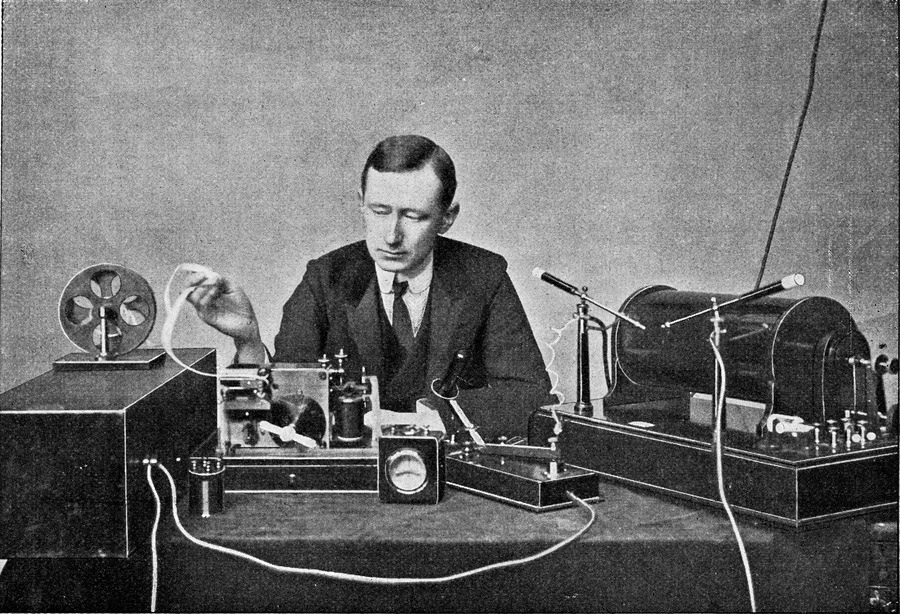Marconi Day
International Marconi Day
by Nick Chilelli, SVP Space Segment
Today, April 22, 2023, we celebrate the man that brought us an invention that remains at the heart of our ABS communications satellites, the radio. International Marconi Day is observed annually on the Saturday closest to April 25, which is the birth date of Guglielmo Giovanni Maria Marconi, inventor of the radio. Communication satellite are merely radio repeaters in space, receiving an uplinked signal, and re-transmitting back to earth. Without Marconi, among several others, we would not have satellites to serve our customers throughout the world.
In 1988, this occasional commemoration was turned into International Marconi Day, with many amateur radio clubs holding events around the world. The main achievements of the life and scientific and experimental activities of Guglielmo Marconi, the man who ushered in the modern Wireless universe in which we all live are listed below.

Guglielmo Marconi was born in Bologna, Italy on April 25, 1874. He built his first laboratory to perform experiments on the propagation of electric waves in 1894. The historical “experiment of Celestini” (from the name of the hill) was made in 1895 when Guglielmo Marconi sent a radio signal at a distance of about 1700m and his brother Alfonso, listening with the receiver, signaled the acknowledge receipt of the signal with a shot.
In 1897, after moving to England where he would do most of his work, Marconi received his first patent for the system of wireless telegraphy (British Patent No. 12,039) for “Improvements in Transmitting Electrical Impulses and Signals, and in Apparatus therefore” and also founded the company “The Wireless Telegraph & Signal Company Limited”, later renamed “Marconi’s Telegraph Company Limited”, in Chelmsford, England. The same year he made demonstrative transmissions for the Italian government in Rome and La Spezia, coming to transmit signals to a distance of about 30 km. A year later, Marconi was commissioned by the Queen Victoria to maintain her residence in the Isle of Wight in connection with the royal yacht cruising in the Channel, on which was the Prince of Wales with an injured leg: in 16 days 150 messages were sent.
In 1901, after successfully transmitted signals from the Island of Wight to the tip of Cornwall (approximately 300 km), Marconi made a transatlantic link of nearly 3400 km, between Poldhu (Cornwall, UK) and St. John’s Newfoundland (Canada), showing empirically that the earth curvature does not affect radio transmissions.
In 1906, his inventions enabled the first regular radio transmission between Poldhu and Cape Cod and a year later established the first radiotelegraph intercontinental service between Europe and North America with an exchange of official messages between the King of England and the Governor of Canada.
On December 10, 1909, Guglielmo Marconi and Ferdinand Braun were awarded the Nobel Prize for Physics for their “contributions to the development of wireless telegraphy.”
During WWI, Marconi offered his contribution to the war effort by assisting the installation of Marconi radio equipment on board ships and – for the first time – planes. Following several incidents during the war in the use of long-wave radio systems, Marconi began the construction of the first short-wave devices in Genoa: This opened a vast horizon in the development of radio with the creation of the new-wave beam that could solve the problem of multiple and current services at very great distances.
In 1919, the Marconi Chelmsford station transmitted its first radio concert, and it was received up to 2000 miles away. A year later, at a conference in New York, Marconi first talked about broadcast on shortwave, as a done deal. On the same occasion, he predicted, based on a series of tests already made, the Radio-localization, that is the future RADAR.
By 1934, Marconi resumed his studies of determination working with increasingly shorter waves in Italy. He had in fact already found the influence of sunspots on the short-wave broadcasts.
Guglielmo Marconi died July 20, 1937, in Rome, at his home in Via Condotti at the age of 63.
